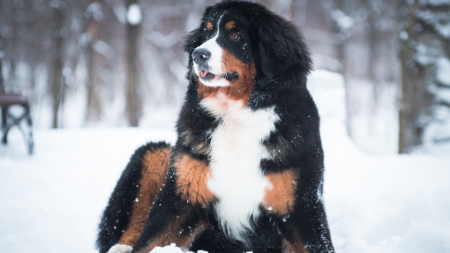Bernese Mountain Dog Breed and Pet Insurance: Protecting a Gentle and Large Companion
The Bernese Mountain Dog is a gentle and large breed known for its loving nature. As they are prone to certain health issues, pet insurance can help protect these magnificent companions. With coverage for veterinary care, treatments, and potential br
- May 17 2023
- 65
- 462 Views
Introduction
When it comes to finding the perfect companion, few breeds can match the gentle and loyal nature of the Bernese Mountain Dog. This magnificent breed not only possesses an imposing and majestic appearance but also has a loving and friendly temperament that makes it an ideal family pet. However, like any other dog, Bernese Mountain Dogs are prone to certain health issues, which is why having proper pet insurance is essential to safeguard their well-being. In this article, we will explore the world of Bernese Mountain Dogs, their characteristics, care requirements, and the importance of pet insurance for their overall health and happiness.
The Bernese Mountain Dog: A Gentle and Large Companion
The Bernese Mountain Dog, often referred to as a "Bernie" or "Bernese," is a large and sturdy breed that originated in the Swiss Alps. These dogs were initially bred to work on Swiss farms, where they would assist farmers in herding cattle, pulling carts, and guarding the homestead. Over time, Bernese Mountain Dogs have become popular as beloved family pets due to their gentle and affectionate nature.
The History of the Bernese Mountain Dog Breed
The Bernese Mountain Dog's history can be traced back to several centuries ago in the canton of Bern, Switzerland. This breed is one of the four Swiss Mountain Dogs, along with the Greater Swiss Mountain Dog, the Appenzeller, and the Entlebucher Mountain Dog. The Bernese Mountain Dog was primarily used as a versatile working dog, known for its strength, agility, and intelligence.
Physical Characteristics of the Bernese Mountain Dog
Bernese Mountain Dogs are large and muscular dogs with a distinctive tricolor coat. They have a sturdy build, balanced proportions, and a powerful presence. The breed's head is broad and flat, with a well-defined stop and a strong muzzle. Their eyes are dark and expressive, reflecting their friendly and kind nature. The Bernese Mountain Dog's most recognizable feature is its beautiful coat, which is thick, shiny, and weather-resistant. The coat consists of a black base color with rust-colored markings on the cheeks, chest, legs, and eyebrows, as well as white markings on the chest, paws, and tip of the tail.
Temperament and Personality Traits
One of the most endearing qualities of Bernese Mountain Dogs is their calm and gentle temperament. They are known for their affectionate and loyal nature, making them excellent companions for individuals and families alike. Bernese Mountain Dogs are typically good with children and get along well with other animals. They are patient, tolerant, and enjoy being part of the family unit. These dogs thrive on human companionship and are happiest when they are included in various activities.
Caring for a Bernese Mountain Dog
Proper care is essential to ensure the health and well-being of your Bernese Mountain Dog. Here are some key aspects of caring for this breed:
Exercise and Activity Requirements: Despite their large size, Bernese Mountain Dogs have moderate exercise needs. They benefit from daily walks, playtime in a securely fenced yard, and mental stimulation. However, it's important to avoid excessive exercise, especially during their growth period, to prevent joint and bone issues.
Grooming and Coat Care: The Bernese Mountain Dog's coat is beautiful but requires regular grooming to keep it healthy and free from matting. Weekly brushing is necessary to remove loose hair and prevent tangles. During shedding seasons, more frequent brushing may be needed. Additionally, regular nail trimming, ear cleaning, and dental care are essential parts of their grooming routine.
Feeding and Nutrition: A balanced and nutritious diet is crucial for the overall health of your Bernese Mountain Dog. High-quality dog food that is appropriate for their age, size, and activity level should be provided. It's important to follow a feeding schedule and monitor their weight to prevent obesity, which can exacerbate certain health conditions.
Training and Socialization: Early training and socialization are important for Bernese Mountain Dogs. They are intelligent and eager to please, making them relatively easy to train. Positive reinforcement methods, such as treats and praise, work best with this breed. Socialization should include exposure to different environments, people, animals, and situations to ensure they grow up to be well-rounded and confident dogs.
Health Concerns and the Importance of Pet Insurance
Like all dog breeds, Bernese Mountain Dogs are susceptible to certain health issues. While not all individuals will experience these problems, it's important to be aware of them and take preventative measures. Some common health concerns in Bernese Mountain Dogs include:
Hip and Elbow Dysplasia: These are developmental conditions that affect the joints and can lead to pain, lameness, and arthritis.
Cancer: Bernese Mountain Dogs are unfortunately prone to various types of cancer, including mast cell tumors and histiocytic sarcoma.
Gastric Dilatation-Volvulus (GDV): Also known as bloat, this is a potentially life-threatening condition where the stomach twists, causing a blockage and cutting off blood supply.
Progressive Retinal Atrophy (PRA): This is a degenerative eye disorder that leads to gradual vision loss and can eventually cause blindness.
Having a comprehensive pet insurance policy for your Bernese Mountain Dog can provide financial protection and peace of mind. Pet insurance helps cover the costs of veterinary care, including routine check-ups, vaccinations, emergency treatments, surgeries, and medications. It ensures that your furry friend receives the necessary medical attention without causing a financial burden.
Choosing the Right Insurance Plan
When selecting pet insurance for your Bernese Mountain Dog, there are several factors to consider:
Coverage and Benefits: Review the coverage options provided by different insurance companies. Look for plans that cover accidents, illnesses, hereditary conditions, and other common health issues specific to Bernese Mountain Dogs. Additionally, check if the policy includes wellness benefits, such as preventive care and vaccinations.
Exclusions and Limitations: Familiarize yourself with any exclusions or limitations that may apply. Some policies may have waiting periods, pre-existing condition exclusions, or breed-specific restrictions.
Reputation and Customer Service: Research the reputation and customer reviews of the insurance company. Consider their responsiveness, claims process, and overall customer satisfaction.
Cost: Compare the premiums, deductibles, and reimbursement rates of different insurance plans. Assess the value for money by weighing the cost against the coverage and benefits provided.
Customer Support: It's essential to choose an insurance provider that offers reliable customer support. A responsive and helpful customer service team can assist you with any inquiries, claims, or concerns that may arise.
Conclusion
Bernese Mountain Dogs are magnificent companions known for their gentle nature and loyal personalities. As a responsible pet owner, it's crucial to provide them with the care they deserve. This includes regular exercise, proper grooming, a nutritious diet, and early training and socialization. However, even with the best care, unforeseen health issues can arise, making pet insurance an important consideration.
By investing in a comprehensive pet insurance plan for your Bernese Mountain Dog, you can ensure that they receive the necessary medical attention without straining your finances. Pet insurance provides peace of mind, knowing that you can provide the best care possible for your beloved furry companion.
FAQs
1. Are Bernese Mountain Dogs good family pets?
Yes, Bernese Mountain Dogs make excellent family pets. They are known for their gentle and friendly nature, making them great companions for children and adults alike.
2. How often do Bernese Mountain Dogs need grooming?
Bernese Mountain Dogs have a thick coat that requires regular grooming. Weekly brushing is recommended to prevent matting and keep their coat healthy and shiny.
3. Do Bernese Mountain Dogs have any special dietary requirements?
While Bernese Mountain Dogs don't have specific dietary requirements, it's important to provide them with a balanced and nutritious diet. Consult with your veterinarian to determine the best food options for your dog's specific needs.
4. What health conditions are common in Bernese Mountain Dogs?
Bernese Mountain Dogs are prone to certain health issues, including hip and elbow dysplasia, cancer, gastric dilatation-volvulus (bloat), and progressive retinal atrophy (PRA).
5. Can you provide some tips for training a Bernese Mountain Dog?
Training a Bernese Mountain Dog is best done using positive reinforcement techniques. Use treats, praise, and consistency to reinforce desired behaviors. Early socialization and exposing them to different environments and situations are also important for their development.


































